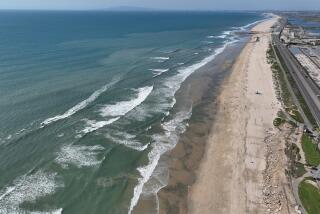ORANGE COUNTY PERSPECTIVE
- Share via
When the tanker American Trader ran over its anchor in the waters off Huntington Beach more than six years ago, it spilled nearly 400,000 gallons of crude oil and killed at least 1,000 birds. Lessons from that incident are still being learned, with one taking concrete shape now in Huntington Beach.
A year after the oil spill, the Huntington Beach Wetlands Conservancy wisely decided that there was too much uncertainty involved in rounding up people to treat animals and birds injured in the wild, including those harmed by disasters like oil spills. The conservancy’s answer was a hospital just for wildlife.
Donations and grants have helped raise funds for a $1.5-million center to provide emergency care solely for wildlife, specializing in treating seabirds. It is a good example of public and private cooperation to solve a problem.
The Wetlands and Wildlife Care Center of Orange County, due to open in December, will be the first in a developing state network of facilities designated to treat wildlife after an oil spill.
Since the American Trader incident, Congress has required tankers to be double-hulled. The Coast Guard requires annual surveys of the ocean floor at the Huntington Beach oil terminal, where the spill occurred. In addition, legislators in Sacramento created a fund financed by the oil industry to pay for oil-spill wardens and contribute to construction of the network of bird treatment centers, including the one in Huntington Beach. Money well-spent.
More to Read
Sign up for Essential California
The most important California stories and recommendations in your inbox every morning.
You may occasionally receive promotional content from the Los Angeles Times.










